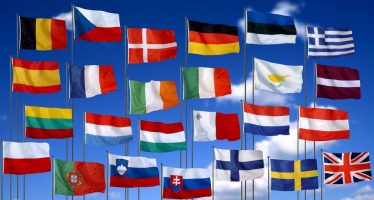From Germany to South Africa – The Oppenheimers: Diamonds Are Not Forever
 “I’m a philistine.” Nicholas F Oppenheimer, worth some $6.5bn, is not likely to be spotted at a theatre or opera house anytime soon. The vast library of rare antique tomes his grandfather Ernest (1880-1957) lovingly accumulated over a lifetime remains but the tangible expression of an odd hobby. The grandson is down-to-earth, discrete, focused, and – according to some – at times as ruthless a businessman as his father Harry was.
“I’m a philistine.” Nicholas F Oppenheimer, worth some $6.5bn, is not likely to be spotted at a theatre or opera house anytime soon. The vast library of rare antique tomes his grandfather Ernest (1880-1957) lovingly accumulated over a lifetime remains but the tangible expression of an odd hobby. The grandson is down-to-earth, discrete, focused, and – according to some – at times as ruthless a businessman as his father Harry was.
At the close of 2011, “Nicky” Oppenheimer (69) made the momentous decision to sell his 40% stake in De Beer’s, a cartel of companies that dominates the diamond industry and, indeed, sets its course. Founded by famed British mining magnate and empire-builder Cecil Rhodes in 1888, De Beer’s has been in the Oppenheimer family since 1927 when German-born Ernest took over the company. Earlier, Ernest Oppenheimer and American financier JP Morgan had set up the AngloAmerican mining company in Johannesburg, South Africa. It was precisely to this company that Nicky Oppenheimer sold his shares in De Beer’s – closing, as it were, the circle.
“Nicky Oppenheimer is no stranger to controversy either.”
The $5.1bn sale was a unanimous family decision bringing the Oppenheimers hundred plus year-long involvement with the diamond industry to a close. It also showcased, briefly, the philosophy that built the family fortune: In business there is no place for emotion. In the 1940s, Ernest Oppenheimer famously refused to supply the allied forces with industrial diamonds at reduced prices for the war effort.
Nicky Oppenheimer is no stranger to controversy either. He caused uproar in 2005 with the statement that Africa was suffering from “donation fatigue.” Mr Oppenheimer went on to explain that the continent would be much better served with investors putting their money into income-generating projects. In fact, Mr Oppenheimer’s comment was both timely and spot-on. The current economic boom lifting an increasing number of countries out of dire poverty is fuelled by private investment rather than aid money.
The Oppenheimer family is now in the process of allocating the capital raised by the sale of De Beer’s among a number of ventures in Africa. “We will be looking for opportunities and we are very Africa-orientated and we are going to be looking, obviously, around the world, but there will be a very clear African bias to what we hope to do in the future.”
The Oppenheimer family, originally from Leipzig in Germany, is today thoroughly South African. Nicholas Oppenheimer’s father Harry (1908-2000) – at the time one of the richest men on earth – was actively engaged in anti-apartheid politics and financed the Progressive Federal Party. He also served a term a member of parliament for Kimberley, eventually becoming the opposition’s spokesperson on economics, finance and constitutional affairs.
You may have an interest in also reading…
Didier Drogba: Just Do It
At a time when transfer sums seldom exceeded seven digits, Didier Drogba’s £24m move to Chelsea in 2004 both broke
Financial Stability in the European Union: IMF Assessment
In its first ever European Union-wide assessment of the soundness and stability of the financial sector, the International Monetary Fund
Samir Barua and 36 Years at IIM-A
Prof. Samir Barua’s tenure as Director of Indian Institute of Management, Ahmedabad will have ended by the time you read


















































































